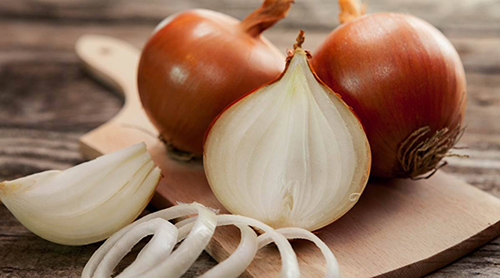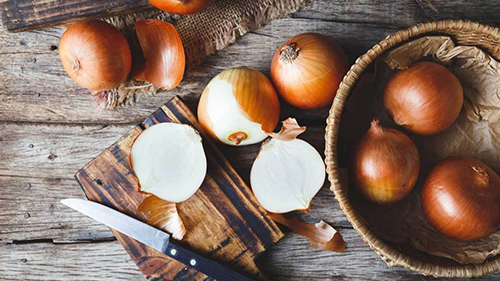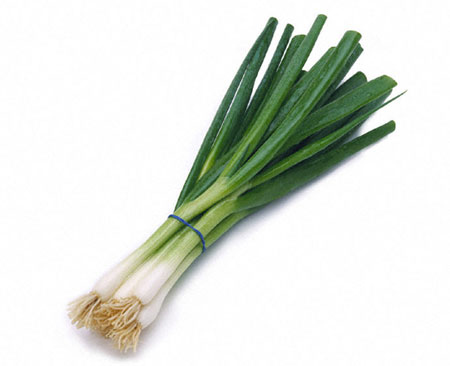Contents
Onion benefits: It says in the fourth book of Moses, the one called Numbers, that while the Israelites wandered in the Sinai desert, they yearned for the foods they had eaten in Egypt.
Specifically, they mentioned onions, garlic, and leeks. It is plausible that onions and other vegetables made up an essential part of the diet of these pyramid-building slaves more than 3500 years ago.

However, onions provide few calories to the diet, particularly when one is engaged in intense physical labor, nor can it be said that they have an incredibly delicious flavor. Therefore, it seems this group of rough slaves valued and missed onions primarily for their medicinal value.
How many must have had bronchitis or pneumonia while sloshing in the cold mud to make adobe bricks? In the onion, as in other allium-loaded foods (garlic and leeks), the Israelites possibly found the many onion benefits that helped them avoid and cure respiratory disorders and gave them vigor and health.
Today, onions continue to be one of nature’s most healing foods.
Scientific Facts
- French: Oignon
- Spanish: Cebolla
- German: Winterzwiebel
- Description: The bulb of the onion plant (‘Allium cepa’ L.) of the botanical family Liliaceae. This bulb is not the plant’s root but somewhat an underground stem thickening. The true roots are formed of fibers on the lesser part of the bulb.
- Habitat: Onions are cultivated in fertile soils and temperate climates on the five continents. China, India, the United States, Russia, Japan, and Spain are the principal producing nations.
Raw onions can stop or relieve an asthma attack thanks to their anti-allergic and bronchodilator abilities. These effects can last up to 12 hours. Inhaling the onions essential oil is also beneficial and is more appropriate for children.
Medicinal Properties and Indications
No particular nutrient stands out when one examines the composition of the onion. The 38 kcal/100 g it provides comes primarily from its glucose, saccharose, and other carbohydrates (6.83%). Proteins are present in a small proportion (1.16%) but noteworthy for a vegetable. Its fat content is negligible (0.16%).
All vitamins are present (except B12), although in small amounts. The same is the case with minerals, among which only potassium (157 mg/100 g) is worth mentioning. Among trace elements, the most abundant is sulfur, which forms part of the onion’s volatile essence.
The onion’s mineral salts are converted to carbonates of alkaline reaction when passed to the blood, which explains this bulb’s remarkable alkalizing effect. Alkalizing foods facilitate the elimination of waste products from the body, which are all acidic.
In contrast to its relatively unimportant nutrient content, the onion is rich in non-nutritive substances of significant physiological activity, such as:

- Essential oils: Among the many onion benefits, this oil is responsible for its typical odor. It is highly volatile and evaporates quickly. Its composition is complicated since it is formed from a mixture of more than one hundred different substances, among which allyl disulfide and thiosulfinate stand out.
- Flavonoids: These glycosides improve blood circulation, prevent blood clots (reduce platelet stickiness), and block the oxidation of low-density lipoproteins, a type of fat responsible for arteriosclerosis. Onions are rich in quercetin, one of the most active flavonoids. A study conducted at the University of Wageningen (The Netherlands) demonstrates that quercetin is well absorbed in the intestine regardless of whether the onion is raw or cooked. The flavonoids and the substances that form this essential oil are attributed to most of the onion benefits: antibiotic, decongestant, antiasthmatic, heart and arterial protector, diuretic, and anti-carcinogenic.
Onion benefits result from many other non-nutritive substances whose actions are not as defined as those of the previous two groups. Among them are:
- Enzymes: The onion is rich in enzymatic substances such as oxidase and diastase, which stimulate digestive processes.
- Glycoquine: Dr. Schneider defines this as a vegetable hormone that reduces the blood glucose level. This hormone explains the favorable effects on diabetics.
- Vegetable fiber: Fiber is one of the onion benefits that enables lipid-lowering and anti-diabetic action.
Many onion benefits have been described, and they have been recommended for various disorders. Since essential oil is very volatile and rapidly impregnates all the body tissues, it is logical to believe it works on multiple organs and systems.
The Top Eight Onion Benefits
Here are those dietary and therapeutic applications that have been scientifically investigated and proven:
Respiratory conditions
The sulfur components that make up the onion’s essential oil instantly enter the circulation from the stomach. The lungs are where they are initially released. This explains why the breath has a distinctive smell even after only a few minutes of consuming onions. Onions have antibacterial, expectorant, and mucolytic effects on gram-positive bacteria. Consuming onions, ideally raw, boiling, baked, or syrup, helps to treat all respiratory infections, from sinusitis to pneumonia.
Bronchial Asthma
A study at the University Ludwig-Maximilians pediatric clinic in Munich, Germany, has shown that thiosulfinate, one of the ingredients in essential onion oil, may reduce bronchial allergic responses in asthma patients.
It has also been shown that the thiosulfinate found in onions affects the brain stem’s respiratory region, causing the bronchial tubes to widen. These studies demonstrate that using raw onions for bronchial asthma is helpful due to their bronchodilator and anti-allergenic properties. You can feel the positive effects on the bronchial passages only a few minutes after consuming onions.
Arteriosclerosis and Coronary Heart Disease
Growing evidence shows that onions reduce the risk of atherosclerosis and thrombosis and enhance blood flow in the coronary arteries. According to research done in 1989 at the University of Limburg in Maastricht, Netherlands, the onion’s cardiovascular advantages have not been satisfactorily proven.
However, several studies conducted in 1996 revealed that those who consume more apples and onions, two of the foods highest in quercetin, had a decreased chance of passing away from a heart attack. Regular onion intake lowers the risk of severe problems like heart attack, increases blood flow in all arteries, and avoids arteriosclerosis.
Elevated Triglycerides
Triglyceride levels that are too high encourage arteriosclerosis and heart disease. It has been shown that ingesting onions’ liquid extract lowers triglycerides in the blood and liver. Additionally, onions raise HDL (good) cholesterol levels, preventing arteriosclerosis.
Kidney Disorders
Onion’s alkalizing impact causes a rise in urine volume, making eliminating waste easier. It is suitable for inclusion in the diets of people with kidney stones, urethritis, or any level of renal insufficiency.
Diabetes
Onions bring down blood sugar levels. Therefore, they are fantastic for those who have diabetes.
Liver disorders
Onions increase the functioning of other glands that produce digestive juice and enhance the liver’s cleansing process. Highly advised in situations of cirrhosis or chronic hepatitis-related hepatic failure.
Cancer
A Chinese research funded by the National Cancer Institute of the United States revealed a much-decreased incidence of stomach cancer in those who consume more onions and garlic. Other studies show the ability of onion and garlic to inhibit the growth of cancer cells and neutralize carcinogens. Therefore, consuming a lot of onions is wholly justified as cancer prevention and in addition to treating certain cancers, such as colon and stomach cancer. Onions, however, had no discernible impact on breast or lung cancer, according to previous Dutch research.

The Welsh Onion
The Welsh onion is an intermediate species (Allium fistulosum L.) between the onion and the leek. It is tenderer than the common onion. In addition to the bulb, you can also eat the leaves and the stalk.
It contains the same nutrients and onion benefits as its counterpart but in somewhat lower concentrations. Its medicinal applications are the same as for the onion. It is usually eaten raw in a salad or lightly toasted with an appropriate sauce.
| French | Ciboulette |
| Spanish | Cebolleta, cebolla, inglesa |
| German | winterzwiebel |
Preparation and Dosage
- Raw: This is among the best ways to eat onions, but for this, they must be fresh. The piquancy is attenuated somewhat by washing them for a few minutes and adding lemon. Those suffering from gastric ulcer or gastritis should eat onions, boiled or baked.
- Boiled in water: Their piquancy disappears and is better tolerated, but their medicinal effects are also diminished. Cooking time should be short, less than a minute, and the resulting broth should also be used.
- Baked: Baked onions are delicious, although the longer they are in the oven, the less effective they are as a medicine.
- Onion syrup: Boil several slices of onion. After mashing them to a paste, add a few spoonfuls of honey or brown sugar.
- Onion juice: This is prepared by soaking a chopped raw onion in a glass of water for several hours.
DISCLAIMER: All content on this website is presented solely for educational and informational objectives. You should not rely on the information provided as a replacement for advice, diagnosis, or treatment from a qualified medical expert. If you are pregnant, nursing, or have any preexisting medical concerns, you should talk to your doctor before using any herbal or natural medicines.
REFERENCES
- George D. Pamplona-Roger, M.D. “Encyclopedia of Foods and Their Healing Power.” George D. Pamplona-Roger, M.D. Encyclopedia of Foods and Their Healing Power. Trans. Annette Melgosa. Vol. 2. Chai Wan: Editorial Safeliz, 2005. 142, 143, 144. Print.
- Cleveland Clinic Health Essentials: This resource offers comprehensive insights into the various health benefits of onions, including their role in heart health, bone strength, antibacterial properties, and aid in digestion. Additionally, it provides nutritional information about onions. Read more at Cleveland Clinic Health Essentials
- Healthline: This website provides an overview of the impressive health benefits of onions, emphasizing their nutrient density, antioxidant properties, and potential to combat various health issues like heart disease and bacterial infections. Explore more on Healthline
- WebMD: For a detailed look into how onions can contribute to your overall health, including their impact on heart health, cancer risk, and insulin production, WebMD is a great source. Learn more at WebMD
